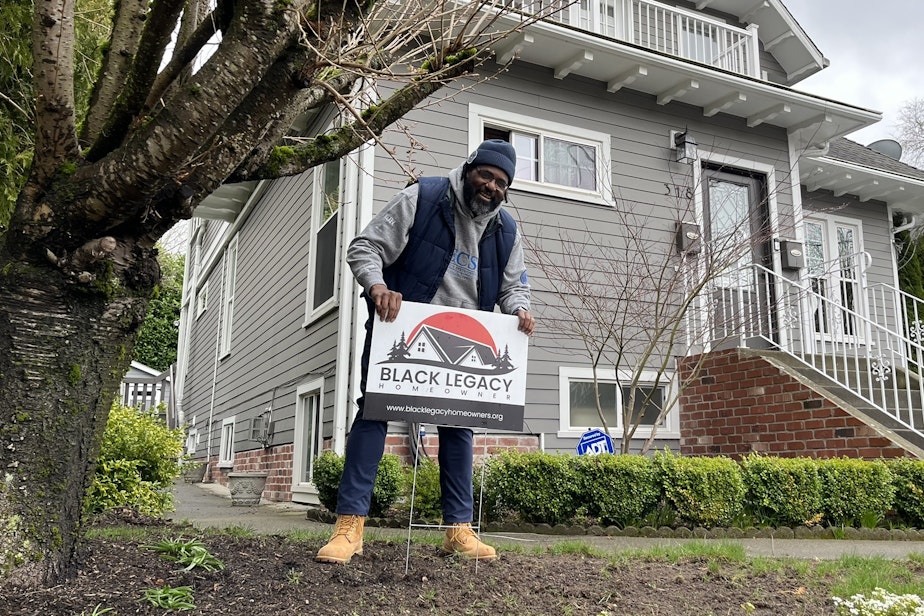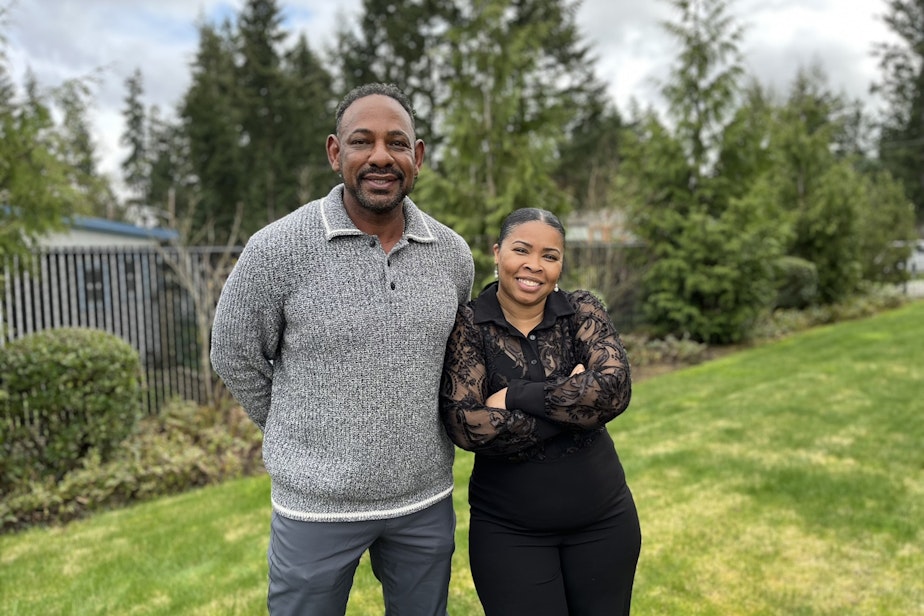Black homeownership program offers hope, but can it help people afford Seattle houses?

Today in Seattle's Central District neighborhood, the number of Black homeowners has reached a historic low. And across Seattle, less than half as many Black households own homes as white families.
So what would it take to turn that around?
Washington state’s Covenant Homeownership Program aims to try.
In this country, for better or worse, the way people build wealth is by owning real estate.
But home ownership is not available to a lot of people.
In the past, that was clearly stated in the paperwork.
“Even if Black people came to you with the money and wanted to buy your house,” says Chukundi Salisbury, volunteer director of Black Legacy Homeowners. “It was in the covenant, in the deed, that said you cannot sell to Black people.”
The University of Washington has compiled maps of those deeds. Many local deeds still include that old racist language, even though those covenants haven’t been legally enforceable since 1968.
Sponsored
That's when the federal Fair Housing Act was passed, exactly one week after the assassination of Dr. Martin Luther King Jr, who had championed fair housing practices.
The Fair Housing Act outlawed both the racist covenants and the practice of "redlining," where banks excluded Blacks and other minorities from obtaining home loans in certain Seattle neighborhoods.
“But we know that it didn't really go away like that,” says Salisbury. “It just kind of went underground.”
Even today, it’s twice as hard for Black families to get home loans as white families. Even when Black families managed to buy homes in Seattle, many were pushed out of the city by things like rising property taxes.
Sponsored
That’s how a neighborhood like Seattle’s Central District went from over 70% Black in 1970 to 12% Black today. When Black families moved out, white families started moving in.
Some of this happened decades ago. But much of it was just in the last few years, starting around the time of the Great Recession. That's according to Seattle’s city demographer, Diana Canzoneri.
R
uby Holland saw those changes happen. She grew up in Seattle in the 1960s and 70s.
Sponsored
She moved away to Atlanta for a long time, then moved back into her mom’s house in the Central District in 2015.
“Gentrification had definitely started and it was going pretty strong by the time I got home,” she recalls. “The neighborhood was pretty much mixed… But quite a few of these homes still had Blacks in them.”

Around that time, Holland attended a community meeting in her neighborhood.
“I remember this white guy asked me… ‘Why don't you move?'” Holland says. "And I said, ‘Why should I?’ And he just said… it was because everybody else was moving.”
Sponsored
So, that was one attitude at the time. But there were other economic forces that drove down Black home ownership in Seattle as well.
Property is taxed based on what can be built there — how valuable that land is. So when a neighborhood is upzoned, property owners can build more homes on it — townhomes, for example.
That potential-to-build increases land values, which raises property taxes for everyone in the neighborhood.
For some residents, that means they can no longer afford to live there, even when they already own their home.
This brings up another reason Black homeownership dropped. When people are in that kind of financial distress, they show up on lists that can be purchased online. That’s when Ruby’s friends would hear a knock at the door.
Sponsored
“It was real estate people trying to buy the house,” she says, recalling what happened to one friend. “And that pissed me off.”
Listen to a related Booming episode on Black Homeownership below:
Every developer, every real estate agent, is trying to make a living. That’s natural.
But if someone comes to your door and pressures you to sell, offering to make all the financial problems go away with a few signatures right there on your doorstep, it can verge on predatory.
Holland says decisions made in moments like that are never good ones. Sellers sometimes sold, only to find out they had sold for too low a price, meaning they could not afford to buy even somewhere less expensive.
“Everybody I talked to, I told 'em, 'No, you don't. You don't have to leave,'" she says. "Don't move.”
Chukundi Salisbury, of the Black Legacy Homeowners group, says blatantly predatory home-buying tactics are rare in the Central District today. He says most remaining Black homeowners there have survived by growing skeptical of offers that seem too good to be true. But he says the underlying financial pressures remain.

W
hat would it take to turn things around and increase Black homeownership in Seattle?
There is no silver bullet. Experts say some of the losses could be permanent.
But they also say Washington's Covenant Home Ownership Program is a good start, if people are willing to try.
The “covenant” in the title refers back to those racist covenants, because this program is trying to undo some of that damage.
- If you live in Washington,
- and if you meet income limit requirements,
- and if you’re the descendant of someone who lived in Washington before racist covenants were outlawed in 1968,
- and if the person who was here then was in one of the targeted groups of those covenants, including Black, Hispanic, Native American, Alaska Native, Korean, Asian-Indian, Native Hawaiian or other Pacific Islander,
- then you can get help with a down payment and closing costs on your first home. Basically, you get a no-interest loan that you don't have to pay back until you sell the house.
The program contains its own funding source: Everybody who buys real estate pays $100 when they file certain documents.
Across the state, those fees add up. So far, the program fund has helped 270 families across the state purchase homes.
RELATED: For homebuyers impacted by racist housing covenants, Washington state offers zero-interest loans
M
any Black households that have been priced out of Seattle have moved south. They’ve relocated down in places like Kent and Tacoma. That's where the program has helped the most people.
Jessica Talton, a mortgage lender in Kent, has personally helped 70 of those families buy houses through the program.
“It's been a game changer for my clientele,” says Talton. “People that never thought home ownership was possible, or who had been turned down before or weren't successful before, who never thought they'd try again. This is giving people hope.”
Kent-based real estate agent Dee Scott says a lot of Black homebuyers she talks to have trouble believing it's even real.
“There's a lot, mentally that one would have to even overcome to even feel like they had the right to this American dream,” she says, as she sits in her office with mortgage lender Michael Fornerette.

“Ooh, I wanna open that up," Fornerette says, turning to her. "Because you know, we talk about the covenant program, they ask me… What do they say?” he asks Scott, rhetorically.
“‘What's the catch?’” Scott answers.
Fornerette nods and laughs.
“‘What's the catch?’ Literally, ‘What's the catch?’ I'm like, ‘What?’” he says. “But you know, when you think about, you know, are you worthy of it, right? ‘What are they trying to lure us into? Are you just, giving this to us? Really?’ So we've been conditioned to always looking over the shoulder. ‘Is this true?’"
"So we have not turned that corner," he continues. "We need more Black families to understand the covenant program. Hey, it's a way in. You’ve got to get in the game.”
T
he program has faced pushback. It could face legal challenges in today’s political environment, which is hostile to affirmative action programs.
Tim Eyman, the anti-tax activist, is one of the people opposed to the program. At a recent Senate hearing on a bill that would expand the program, he said, “The voters of the state in 1998 approved an initiative that said the government can't give preferential treatment to anyone based on their race, their gender, their ethnicity, their national origin, or their color. This flies in the face of that.”
Eyman is the one who helped pass that initiative back in late 90s.
He’s not the only one who feels this way. Some experts have said it could end up before the U.S. Supreme Court, which struck down affirmative action policies in college admissions a couple years ago.
The Covenant Homeownership Program’s creators sought to make it legally bulletproof, taking a year to study how to implement it after the Washington state Legislature created it in 2023.
Now, thanks to a new law created by Rep. Jamila Taylor (D–Federal Way) during the 2025 legislative session and signed into law by Gov. Bob Ferguson in April, the program is expanding.
Before, the program only really worked in places far south of Seattle, like Federal Way or Pierce County. It was not quite generous enough to cover the cost of down payments on Seattle homes.
The bill that just passed expands the program's maximum income level, meaning a homebuyer can make more money and still qualify. Going forward, the revamped program completely forgives the loans for low-income households after a few years.
That could open the door for some to purchase modest homes, such as condos built by Habitat for Humanity, in pricier Seattle.
Some experts say this could start to reverse the trend and increase black homeownership in Seattle and across Washington state.
RELATED: Federal work shaped a Black middle class. Now it's destabilized by Trump's job cuts
D
espite all the losses of Black homeowners over the years, Seattle's Central District still has its holdouts. People like Ruby Holland. And they’re not just part of the past, they’re a critical part of the future, too, because they’re helping preserve Black households there and making it possible for future generations to stay.
On a recent walk through the Central District, Chukundi Salibury, of Black Legacy Homeowners, proudly pointed to homes where long-time Black neighbors like retired King County Councilmember Larry Gossett live.
They’re easy to find, because they have lawn signs. In front of one home surrounded by construction materials, Salisbury spoke about the owner.
“He has lots of people wanting to buy this property from him, you know, and he could have just checked out,” Salisbury says. “But, he told me that that was like his grandma's wish: ‘Don't sell my property.’ And so he hasn't. He took his grandma's generational wealth and, and he didn't just sit on it. He's renovating it."
“Look at this. This is amazing. This is amazing," Salisbury adds. "I'm gonna get a picture of it right quick.”
The home in question has had a complete renovation — new siding, new utilities, new front deck. Around back is a brand-new backyard cottage.
“And so, and when you got so much gentrification and so many people being displaced, it's good to see this ray of hope, right?" Salisbury says. "This is a Black-owned home and look at it, he's doing real construction. This is the next level for us. The sky's the limit for this guy. And his Black family, his Black kids, his son can come back. He's got a daughter, they can come back and live here. And this is gonna bring Black people back to the CD.”
To learn more about Washington’s Covenant Homeownership program, visit the program’s website here. Expansions in program eligibility, which are not listed on the website yet, will go into effect at the end of July 2025.




